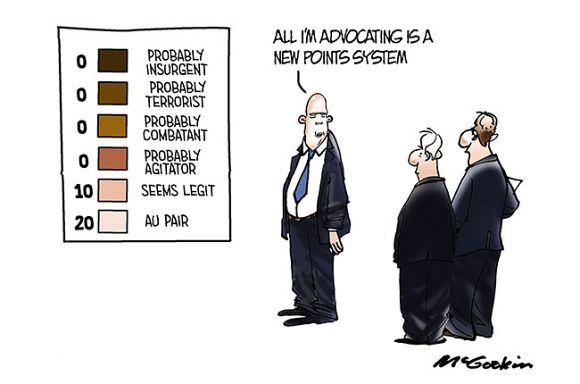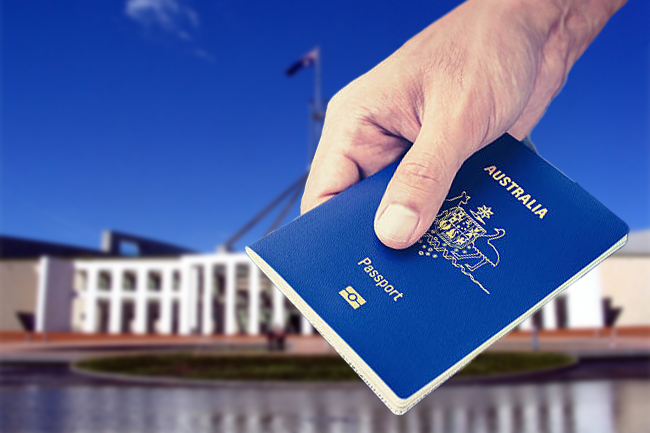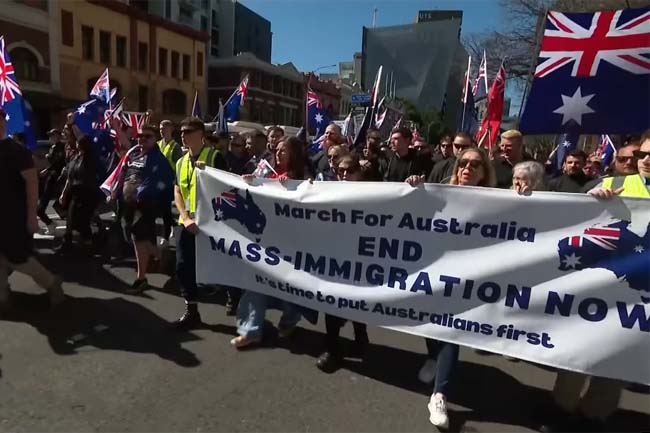Shadow Home Affairs Minister James Paterson has again shown the Coalition's ignorance toward immigration policy following suggestions for Palestinian refugees, writes Dr Abul Rizvi.
AFTER OPPOSITION LEADER Peter Dutton’s thought bubble of banning Palestinians from accessing visas to Australia, which itself would be illegal, his Shadow Home Affairs Minister, James Paterson, continues to dig himself into a deeper and deeper policy hole in an attempt to justify his boss' idea.
Before Paterson jumped on the idea of using Temporary Protection Visas (TPVs), Nationals Leader David Littleproud on Sky News had criticised Labor’s abolition of TPVs in this context, a completely irrelevant criticism.
James Paterson now proposes that TPVs be resurrected for Palestinians arriving since 7 October 2023 and that they be removed from Australia after the war is over (whenever that may be).
Neither Littleproud nor Paterson seem to understand that TPVs were for people who arrived without a visa – essentially boat arrivals – and were subsequently successful in meeting Australia’s protection obligations. They were designed to deter boat arrivals although there is little evidence they were a successful deterrence mechanism.
Palestinians are arriving in Australia with a visa so they would not be eligible for a TPV even if it was still possible to apply for these.
Paterson says:
“We don’t think permanent visas is the right approach. We think Temporary Protection Visas under the former government was the right approach. That allows people to be safe and stay here while they can, but to return home when it’s safe to do so.”
In this statement, Paterson shows that he simply doesn’t know the history, the policy or the law around TPVs.
The fact is that TPVs were never used by the Coalition Government for people who arrived in Australia on valid visas and subsequently engaged Australia’s protection obligations. Those people have always been granted permanent protection.
TPVs weren’t used in the way Paterson is suggesting by the Howard Government that developed them. They weren’t used that way by the Abbott Government when it was in full “border protection” mode.
They weren’t even used that way by Peter Dutton when he was Home Affairs Minister and presiding over the biggest labour trafficking scam abusing the asylum system in Australia’s history.
The policy of all these governments, as is current policy, was that those who arrive in Australia on a valid visa and engage Australia’s protection obligations are granted a permanent visa. Under all those governments, thousands of people were granted permanent protection every year, as they are currently.
Paterson seems to be proposing that for Palestinians alone, the law should be changed such that if they do engage Australia’s protection obligations, they should only get temporary protection “until the war is over”.
Leaving aside how such a law could be drafted without offending all sorts of other legal provisions such as the Racial Discrimination Act and assuming such a law would be passed by the Parliament, there is a range of practical considerations that Paterson seems to have ignored.
First, is Paterson saying his proposed change in the law should operate retrospectively? Likely, the 1,300 Palestinians who have arrived in Australia so far and may apply for asylum will have either done so by now or will do so in the next few months. Those applications will have acquired a legal right to be considered for permanent protection. Trying to retrospectively take that legal right away would be setting all sorts of appalling legal precedents.
Second, what access to services will the Palestinians on these modified TPVs have? When the Howard Government used Temporary Safe Haven visas for Kosovars evacuated from Kosovo during the 1998 Balkans conflict, Australia met all costs of travel and stay in Australia.
Because the fighting ended relatively quickly and the Kosovars knew from the outset they were going to be returned to Kosovo when the fighting ended, most of the Kosovars could be returned without too many difficulties because they were staying in government-funded accommodation well away from the Australian community (mainly old military barracks). That is not the situation with the Palestinians who are living in the Australian community most likely with relatives.
Third, how are we to judge when it is safe to send people back to Gaza? Even when there is a ceasefire, it is highly unlikely the Israeli military will relinquish control of Gaza. Unlike the Kosovo situation which was relatively safe to return to, we would likely be sending the Palestinians back to a territory occupied by a foreign and aggressive power that has already killed tens of thousands of Palestinians.
The community resistance to such removals, especially after the Palestinians have been living in the Australian community for many months and more likely years, would be massive. It would make the community resistance to Dutton’s attempted removal of the Biloela family seem mild.
Just as Donald Trump is unlikely to have considered the practicalities and costs of his mass deportation policy, Paterson does not seem to have considered the practicalities and costs of his policy.
Perhaps the short-term political benefit is all that matters to him and Dutton at this stage. He would know his policy would get strong support from most parts of the Murdoch press.
Dr Abul Rizvi is an Independent Australia columnist and a former Deputy Secretary of the Department of Immigration. You can follow Abul on Twitter @RizviAbul.
Related Articles
- This Week in IA: The Coalition's horrific economic management
- Coalition's misogyny fuelling domestic violence
- Cannibalism, conservatives and lies: Australia’s Nemesis story
- Taylor and Ley continue long Coalition tradition of fudging the figures
- EDITORIAL: Taylor and Ley continue long Coalition tradition of fudging the figures
 This work is licensed under a Creative Commons Attribution-NonCommercial-NoDerivs 3.0 Australia License
This work is licensed under a Creative Commons Attribution-NonCommercial-NoDerivs 3.0 Australia License
Support independent journalism Subscribe to IA.















